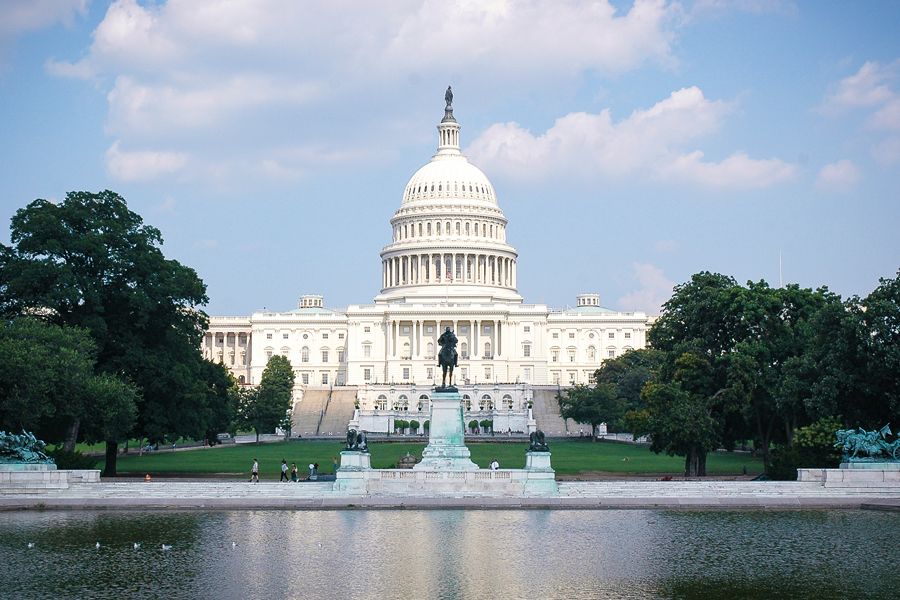The midterm election results and consequent increase of Republican power in Congress will likely result in ESG being even more of a punching bag among conservatives than it already is, observers say.
As of Thursday, votes strongly indicated the Republican party would gain a majority in the House. And it was still unclear whether Democrats would maintain a thin majority in the Senate, with several races too close to call and potentially heading to a runoff.
In the immediate future, that doesn’t mean much on the regulatory front, given the Democrat majority among commissioners at the Securities and Exchange Commission and the Biden administration’s control over the Department of Labor.
“What we are looking at is at least a Republican House. That will increase the noise about attacking ESG and sustainable investing,” said Bryan McGannon, director of policy and programs at US SIF: The Forum for Sustainable and Responsible Investment, during a panel discussion Thursday held by the organization.
“There will be a lot more hearings. The reality is that nothing [Republicans] move forward legislatively will become law. It requires a president’s signature,” he said. “Life at the SEC will be hard because of information requests and oversight hearing.”
But, he said, the Democratic commissioners “have three votes today. [And] they will have three in January. They will be able to move forward with their agenda without much concern.”
More anti-ESG
“It is quite likely that many states will continue to have their own initiatives on ESG, and they are absolutely bifurcated,” said Julie Gorte, senior vice president for sustainable investing at Impax Asset Management. While net zero has been focus of state efforts – both against and in favor of sustainable investing – other topics such as abortion access could also arise as factors in those campaigns.
Conservative-led states including Texas, Louisiana, Florida, West Virginia, Idaho and Oklahoma are among those that have moved to penalize or cut business with financial services companies that appear to have positions on sustainable investing.
Meanwhile, more than a dozen Democratic state treasurers sent a letter to other states, criticizing moves to blacklist companies based on ESG stances. And the New York City comptroller has urged BlackRock to take more serious actions in achieving net-zero emissions.
“For the most part, sustainable investing is about value, not values,” Gorte said. Although fossil fuel companies have benefitted financially in the wake of Russia’s war against Ukraine, oil and gas stocks had underperformed the broader market from 2008 through 2021, she noted.
“Vladimir Putin is not a long-term value driver,” she said.
Even with the stronger returns seek in energy stocks, sustainable funds have seen stronger net sales in the US relative to all other ETFs and mutual funds as a group. Through September, there were $195bn in net outflows from US ETFs and mutual funds in total, while sustainable funds saw net inflows of $8.6bn, said Jon Hale, global head of sustainability research at Morningstar.
Going forward
The anti-ESG trend all but exploded this year, with some politicians framing it as a rallying point against progressives, with “wokeness” being a broader theme. That strategy might not have resonated much with voters, especially amid wider concerns about abortion rights, the economy, the future of democracy and other issues. Election results that saw Democrats lose fewer seats in the House than they expected.
However, there could be more attention on ESG in Congress beginning next year, with more Republicans potentially taking issue with it.
That would lead to more attention on ESG and sustainable investing, which presents an chance to further make the case for them, Hale said.
“It’s an opportunity to further articulate the case for ESG, if we see Congressional hearings,” he said. “A lot of folks don’t really know what the term ‘ESG’ is really about … Republicans are trying to fill that up with a negative definition and connotation – but there will be a lot of counters to that.”
The anti-ESG efforts could also suffer from a lack of coordination, given the narrow margin that conservatives have in the House and, “especially, given the character of that caucus is going to be chaotic to say the least,” he said.
And despite the likelihood that the SEC will publish the final version of its climate-disclosure rule for public issuers next year, that rule will all but certainly face legal challenges.
“[Republicans] are the only major political party in the world … that has such an extreme position on climate change,” Hale said.
Earlier this year, the US Supreme Court sided with West Virginia in its lawsuit against the EPA, a decision that relied on the “major questions doctrine.” The majority opinion found that the regulator could not act out of the scope of its duties set by Congress.
Although Congress hasn’t delegated authority to the SEC to promulgate rules around climate change, the agency has had authority for the better part of a century in making securities issuers disclose risks, Hale noted. And climate risk is widely seen as a material risk in the investing world.
The final SEC rule “is going to be litigated in light of this new major questions doctrine,” he said.








